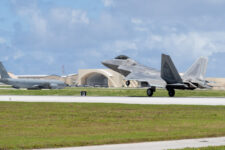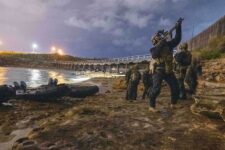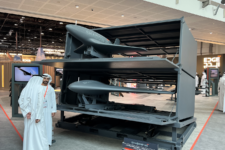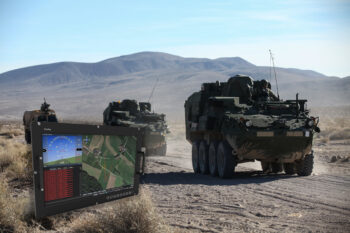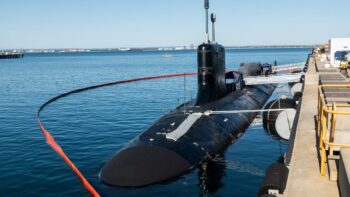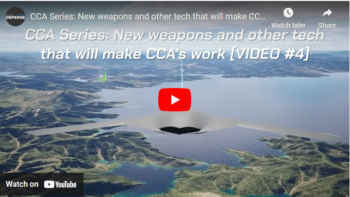
Deputy Prime Minister and Minister of National Defence Władysław Kosiniak-Kamysz signs the letter of acceptance on 96 Boeing-made AH_64E helicopters. (Wojciech Król/CO MON)
WARSAW — Poland this week officially signed its Letter of Offer and Acceptance (LOA) for the purchase of 96 Boeing AH-64E Apache helicopters for the Polish Land Forces, making a major step forward on its “Kruk” Attack Helicopter program.
The signing occurred on Aug. 13 at the 56th Air Base, located at Latkowo, Poland. It was formally signed by Deputy Prime Minister and Minister of National Defence Władysław Kosiniak-Kamysz, alongside defense officials and representatives from industry. The deal, worth $10 billion, continues Poland’s astounding military buildup over the last few years, and will see the replacement of aging post-Soviet Mi-24 Hind helicopters.
“Today we are taking a milestone in transformation, in equipping ourselves with the most modern and best AH 64E Apache attack helicopters in the world. This is a breakthrough moment of purchase by Poland for the needs of the land forces, which have a component related to helicopters,” said Kosiniak-Kamysz.
The agreement — a Foreign Military Sales (FMS) case, meaning it was signed between the governments of Poland and the US — covers the delivery of the 96 AH-64E Apaches, along with a logistics package (including equipment for helicopter maintenance, airport and hangar equipment and technical support), a training package (training for pilots and technical personnel, as well as flight simulators and trainers) and a supply of ammunition and spare parts.
RELATED: US giving Poland another $2B loan to buy American-made weapons (Exclusive)
“This is an agreement that changes the face of aviation, changes the face of the functioning of the Polish army and is an element of complementation of the purchases that are being made. The philosophy of the functioning of the Polish armed forces is cooperation, it is integration. Armored forces cannot function without good reconnaissance, they cannot function well without helicopters. They cannot function well without drones, without the air force,” added Kosiniak-Kamysz.
The AH-64s are to be delivered to Poland between 2028-2032, and will be subordinated to the 1st Land Forces Aviation Brigade (1 BLWL), a tactical unit consisting of the 49th Air Base in Pruszcz Gdański, the 56th Air Base in Inowrocław and the Central Group of Tactical Air Area Control Teams. The 1 BLWL was formed in 2011 and is equipped with Mi-24s and Mi-2 Hoplites, and relatively new W-3PL Głuszec helicopters. The AH-64s will be based at Inowrocław, Malbork and Świdnik.
As a part of agreement, around the end of the year, the Polish army will receive eight older AH-64Ds, which will be leased from the US Army. In order to ensure the proper implementation of the Apache attack helicopters, the first Polish pilots and engineers completed training in mid-June on this type of helicopter in the US, with more training ongoing. The Aviator Qualification Course for piloting an Apache helicopter lasts eight months, and begins with an English language course at Lackland in San Antonio, Texas, then training in Fort Novosel in Alabama.
Notably, Kosiniak-Kamysz made clear he expects to continue to spend on defense modernization. He announced that in the coming months “the priority will be the development of unmanned forces. The Polish army needs hundreds of thousands of drones, primarily reconnaissance, which will cooperate with Apache helicopters. We are working on this together with the American government.”
Two Offset Agreements Set
The LOA comes a week after the Secretary of State at the Poland’s Ministry of National Defense Paweł Bejda signed two commercial offset agreements with Apache prime contractor Boeing and General Electric, the provider of the engines. In both cases, Polish industry stands to benefit.
The Boeing agreement covers seven commitments with a value of more than $102 million. Under the agreement, workers will be trained to carry out inspections, repairs and overhauls of selected AH-64E components at Wojskowe Zakłady Lotnicze (Military Aviation Works, WZL-1) in Łódź, train AH-64E maintenance personnel at Military University of Technology (Wojskowa Akademia Techniczna, WAT) in Warsaw and assess the ground support equipment manufactured by Warsaw’s Central Military Bureau of Design and Technology (Wojskowe Centralne Biuro Konstrukcyjno-Technologiczne, WCBKT) in terms of their compatibility with AH-64E helicopters.
“We are excited to work with the Polish industry team and we are confident that this team will be vital to field and sustain the Apache fleet for decades to come. Working together, we will jointly develop a robust network combining the potential of WZL-1 and WCBKT with the training of skilled professionals and maintainers at the Military University of Technology to support the aircraft”, said Christina Upah, Boeing’s vice president for attack helicopters, in a statement.
The offset agreement with General Electric covers six different obligations, with a total value of over $136 million. Under the agreement, WZL-1 will provide licensed MRO support for the T700/CT7 engines on the AH-64 Apache as well as the Sikorsky S-70i Black Hawk, and Leonardo AW149 and AW101 helicopters that are in the Polish Armed Forces aircraft fleet. WAT will manage training, including T700/CT7 engine training, for Polish technicians and military personnel; additionally, WZL-1 employees will support the Polish fleet as well as preparing future engineering staff for the Polish Armed Forces.
The agreement also paves the way for future partnerships in Poland on GE Aerospace’s combat engines like the F110, F414, and F404, where relationships with the Polish defense industries will be key.
“These collaborations with WZL-1 and WAT will be the key to ensuring Poland has the right capabilities and resources to support Poland’s growing fleet of GE Aerospace’s T700/CT7 engines. WZL-1 has significant expertise in engine MRO services, and WAT is known for its sophisticated military training and producing well qualified technicians who will work on these engines for decades to come”, said Rita Flaherty, vice president for global sales & business development at GE Aerospace.
Hypersonic missile defense deserves predictable and sustainable funding
Keeping the Glide Phase Interceptor program on track needs to be a priority for the new administration and Congress, writes former NORTHCOM officer Howard “Dallas” Thompson.


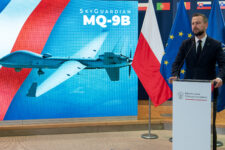


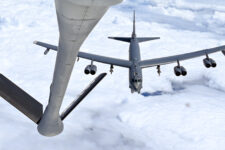

![RS179755_PMCS2620-FCAS-JPN-5A[1x1]](https://breakingdefense.com/wp-content/uploads/sites/3/2024/12/RS179755_PMCS2620-FCAS-JPN-5A1x1-e1734095138256-225x150.png)
